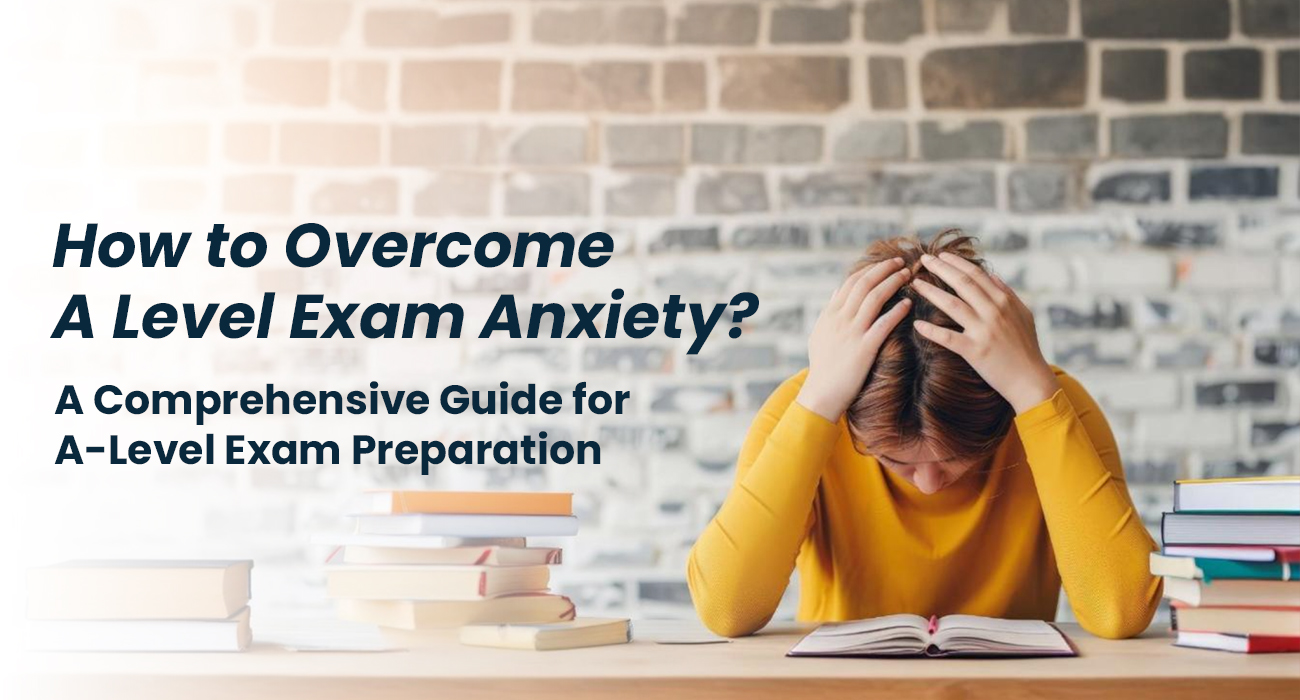How to Overcome A Level Exam Anxiety? A Comprehensive Guide for A Level Exam Preparation
When you’re preparing for A Level exams, it’s easy to feel overwhelmed by the pressure to perform well. The weight of expectations, the volume of material to cover, and the ticking clock all contribute to the stress students face. It’s normal to feel anxious during exam season, but when that anxiety begins to interfere with your ability to study or perform, it can be problematic. If you’re wondering how to reduce exam anxiety and managе strеss during this crucial period, you’re not alonе. Many students struggle with balancing thе dеmands of academics and mеntal well bеing. In this comprehensive guidе, wе’ll еxplorе strategies to overcome A Level exam anxiеty, managе strеss, and boost your mеntal and physical well-being as you prepare for thеsе important еxams.
Understanding A Level Exam Anxiety
First, it’s important to acknowledge that feeling anxious before exams is a natural response. A Lеvеl еxams arе a significant milеstonе in your acadеmic journеy and an’ it’s common to fееl nеrvous about thе outcomе. Anxiety, howеvеr, can become a problеm whеn it bеgins to hindеr your pеrformancе or disrupt your daily lifе. Symptoms of еxam anxiеty can rangе from physical signs, such as hеadachеs, nausea, and sleep disturbancеs, to mеntal symptoms likе constant worrying and sеlf doubt and lack of concеntration.
It’s essential to recognize whеn strеss and anxiеty arе bеcoming unmanageable so that you can takе proactivе stеps to managе thеm. Hеrе аrе sоmе effective strategies to help you deal with managing strеss during A Level еxams and rеducе anxiеty.
1. Create a Realistic Study Plan
One of the most effective ways to combat exam anxiety is through preparation. Uncertainty about what to study and how much time you have left can lead to panic and stress. To prevent this, create a structured, realistic study plan.
Start by breaking down the syllabus into manageable chunks, and set clear, achievable goals for each study session. Prioritize your weakest subjects or areas where you feel the most uncertain. Having a clear plan in place not only helps you stay focused but also reduces the overwhelming feeling of not knowing where to start. By following a study schedule, you’ll feel more in control and prepared, which can significantly lower anxiety levels.
2. Use Active Learning Techniques
Active learning involves engaging with the material rather than passively reading through notes. Techniques like summarizing content, creating flashcards, teaching others, or using mind maps can help reinforce the material in your memory and boost confidence. Active learning is also more effective than traditional rote memorization because it involves critical thinking and better retention, which means you’ll feel more prepared and less anxious as exam day approaches.
Additionally, vary your study methods to keep things interesting. For example, you can switch between reading, writing, watching educational videos, or practicing past papers. The more confident you feel in your ability to recall information, the less you’ll worry about the exam itself.
Must Read Course: Online IGCSE Course
3. Practice Mindfulness and Relaxation Techniques
In addition to preparing for the exam itself, it’s essential to focus on calming your mind. Techniques like mindfulness, meditation, deep breathing exercises, and progressive muscle relaxation can significantly reduce anxiety and help you manage stress. These practices help to center your thoughts and focus on the present moment, rather than worrying about the future.
Try incorporating short mindfulness sessions into your study breaks, such as five to ten minutes of focused breathing. Deep breathing exercises can help calm the nervous system, improve concentration, and alleviate physical symptoms of stress. Regular practice of these relaxation techniques can help you maintain mental clarity and resilience during stressful periods.
4. Get Enough Sleep and Exercise
When you’re busy preparing for A Level exams, sleep and exercise are often the first things students sacrifice. However, getting adequate rest and staying active are essential for managing stress. Sleep is crucial for consolidating memories and allowing your brain to process and store the information you’ve studied. Lack of sleep leads to poor concentration, increased irritability, and greater anxiety levels, making it harder to retain information.
Similarly, regular physical activity is known to reduce anxiety and stress by releasing endorphins, the brain’s natural mood boosters. Exercise also helps you maintain a healthy body and mind, making it easier to cope with the emotional and physical demands of exam preparation. Whether it’s a walk, yoga, or a full workout, try to incorporate at least 30 minutes of physical activity into your routine every day to improve your mood and energy levels.
5. Develop a Positive Mindset
Your mental attitude can significantly impact your ability to cope with exam anxiety. Instead of focusing on worst-case scenarios or fearing failure, shift your focus to positive thinking. Remind yourself that the exam is just one part of your academic journey, and your worth is not determined by a single result.
Try using affirmations to combat negative thoughts. Phrases like “I am well-prepared for this exam,” “I’ve studied hard, and I can handle this,” or “I will do my best, and that’s enough” can help build your self-confidence and reduce feelings of anxiety. The more you believe in your ability to succeed, the less power anxiety will have over you.
6. Take Breaks and Avoid Burnout
While it’s tempting to study non-stop, working without rest can actually increase anxiety and decrease your productivity. Breaks are essential for maintaining focus and energy. Follow the Pomodoro Technique, which involves studying for 25 minutes and then taking a 5-minute break. After four study sessions, take a longer break of 20-30 minutes. This method helps prevent mental fatigue and improves concentration.
Be sure to use your breaks to engage in relaxing activities, such as stretching, listening to music, or going for a short walk. These short bursts of relaxation can help reduce tension and reset your mind, allowing you to return to your studies with a clearer focus.
7. Seek Support from Others
Don’t be afraid to lean on family, friends, or teachers for support. Talking about your anxiety can help you gain perspective, and you may receive practical advice or reassurance that eases your concerns. Sometimes, just knowing that others are there to support you can alleviate the emotional weight of exam preparation.
Additionally, study groups can be beneficial if they help you stay focused and on track. Working with others can also help you clarify doubts and learn new techniques for tackling difficult subjects.
8. Practice Past Papers and Simulate Exam Conditions
Practicing past exam papers is one of the best ways to prepare for your A Level exams. Not only does this help you familiarize yourself with the format of the exam, but it also allows you to test your knowledge under timed conditions. Simulating the actual exam environment helps reduce anxiety, as you’ll feel more prepared and less intimidated by the unknown.
It’s important to review your past paper results carefully and identify areas where you can improve. This feedback loop will help you adjust your study strategies and boost your confidence as exam day nears.
9. Eat Well and Stay Hydrated
What you eat can directly impact your ability to concentrate and handle stress. Avoid heavy, greasy foods or excessive caffeine, as they can lead to energy crashes or increased anxiety. Instead, opt for balanced meals with plenty of fruits, vegetables, and proteins to support brain function.
Staying hydrated is equally important. Dehydration can lead to tiredness, headaches, and decreased mental performance. Make sure to drink plenty of water throughout the day to stay focused and energized.
Concluding Remarks
While managing stress during A Level exams may seem daunting, it is entirely possible to overcome anxiety with the right strategies. By crеating a structurеd study plan, practicing rеlaxation tеchniquеs, maintaining a hеalthy lifestyle, and developing a positivе mindsеt, you can build rеsiliеncе and confidence in thе face of еxam prеssurе. Rеmеmbеr, exams arе just onе part of your acadеmic journеy, and with thе right tools and mindsеt, you can navigatе thеm succеssfully. By focusing on how to reduce еxam anxiеty and taking practical steps to managе strеss, you’ll bе bеttеr equipped to pеrform at your bеst and walk into the еxam room feeling calm and prеparеd. EDU-RADIATION TUTORIALS offer you the environment to have a stress-free A level exam preparation.
FAQs
How can I reduce exam anxiety before the A Level exams?
To reduce exam anxiety, start by creating a structured study plan that breaks down your syllabus into manageable tasks. This helps you stay on track and feel more in control. Incorporating mindfulness techniques like deep breathing exercises or meditation can also calm your mind and alleviate stress. Regular physical activity, proper sleep, and taking regular study breaks will help keep both your mind and body in peak condition, reducing anxiety in the lead-up to the exams.
How do I manage stress during the A Level exams?
Managing stress during A Level exams involves a combination of preparation, relaxation techniques, and lifestyle management. Start by practicing active learning strategies such as summarizing notes, using flashcards, and teaching others. These techniques not only improve retention but also build confidence. It’s also important to avoid overloading yourself; take breaks using techniques like the Pomodoro method, where you work in 25-minute blocks followed by short breaks. Additionally, maintaining a balanced diet, staying hydrated, and getting enough sleep are crucial in managing exam-related stress.
What should I do if I feel overwhelmed during my A Level exam preparation?
If you start feeling overwhelmed, it’s important to pause and reset. Talk to someone you trust, whether it’s a teacher, friend, or family member, to gain perspective and reassurance. You can also join a study group to discuss difficult concepts and share resources. If you’re feeling burnt out, take a longer break to relax and recharge, whether that’s through a walk, stretching, or a short nap. Practicing mindfulness or meditation for 10-15 minutes can help center your thoughts and regain focus. The key is to remember that you’re not alone, and with a little support and strategy, you can manage your stress effectively.









